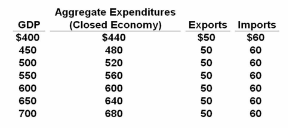Increasing marginal opportunity cost implies that
A) that rising opportunity costs makes it inefficient to produce beyond a certain quantity.
B) the law of scarcity.
C) the more resources already devoted to any activity, the benefits from allocating yet more resources to that activity decreases by progressively larger amounts.
D) the more resources already devoted to any activity, the payoff from allocating yet more resources to that activity increases by progressively smaller amounts.
D
You might also like to view...
The idea that higher prices reduce the purchasing power of financial assets and lead to less consumption is known as the:
a. real balances effect. b. interest rate effect. c. foreign purchases effect. d. income effect. e. aggregate demand effect.
Refer to the above data. If this economy were an open economy, the equilibrium GDP will be:

A. $650 billion
B. $600 billion
C. $550 billion
D. $500 billion